

#1 17.2.13. N.b. (1) The affirmations in this document aren't binding for Victorian IOPS chapters, they represent points of agreement reached by those who attended the meeting.
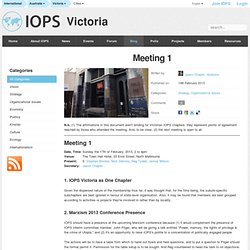
And, to be clear, (2) the next meeting is open to all. Meeting 1 1. IOPS Victoria as One Chapter Given the dispersed nature of the membership thus far, it was thought that, for the time being, the suburb-specific subchapters are best ignored in favour of state-level organisation. 2. IOPS should have a presence at the upcoming Marxism conference because (1) it would complement the presence of IOPS interim committee member, John Pilger, who will be giving a talk entitled "Power, memory, the rights of privilege & the crime of Utopia," and (2) it's an opportunity to raise IOPS's profile to a concentration of politically engaged people.
The actions will be to have a table from which to hand out flyers and field questions, and to put a question to Pilger should the format permit it. #2 3.3.13. N.b. (1) The affirmations in this document aren't binding for Victorian IOPS chapters, they represent points of agreement reached by those who attended the meeting.
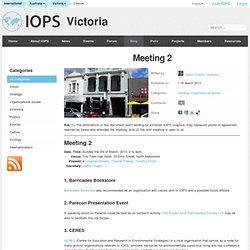
#3 x.x.13. N.b. (1) The affirmations in this document aren't binding for Victorian IOPS chapters, they represent points of agreement reached by those who attended the meeting.
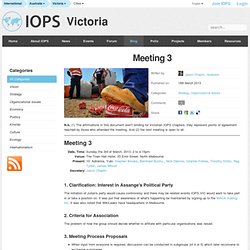
And (2) the next meeting is open to all. Meeting 3 1. Clarification: Interest in Assange's Political Party The initiation of Julian's party would cause controversy and there may be related events IOPS VIC would want to take part in or take a position on. #4 7.4.13. Date: Sunday the 7th of April, 2013, 2 to 4:15pm Venue: Global Cities Research Institute.
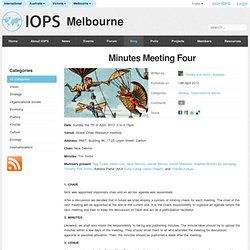
#5 21.4.13. Date: Sunday the 21st of April, 2013, 2:00-5:00pm Venue: Global Cities Research Institute Address: RMIT, Building 96, 17-23 Lygon Street, Carlton Chair: Stephen Brooks Minutes: Reg Tydell.
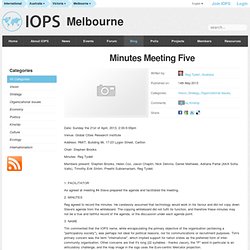
#7 19.5.13. Date: Sunday the 19th May, 2013, 2pm Venue: Global Cities Research Institute Address: RMIT, Building 96, 17-23 Lygon Street, Carlton Facilitator: Jason Chaplin Minutes: Orlando Forbes Members present: Youbi Lee, Joel, Stephen Brooks, Timothy Erik Ström, , Jason Chaplin, Bernhard Buntru and Orlando Forbes.
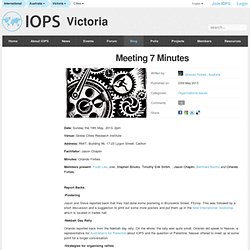
Report Backs. #8 2.6.13. Minutes IOPS General Meeting 02/06/13 Present: Yobi, Preethi (facilitator), Joel, Tim, Jason, James, Orlando, Bernard, Kat + Theo + Johnny (Doing It Ourselves), Nick, Adriana, Helen (minutes) Doing It Ourselves members came to have a chat about what they’re up to and also to find out about IOPS Here are some relevant links: Doing It Ourselves (incl. animation about the financial crisis) Transition Towns The Sharehood Points I picked up from the conversation: IOPS has made a clear commitment to the limits of growth although this might be better put as ‘degrowth’Both DIO and IOPS resilience and sustainabilityThe ‘green’ movement needs to be politicised/radicalised‘Green Capitalism’ as an issue for DIO and IOPS.
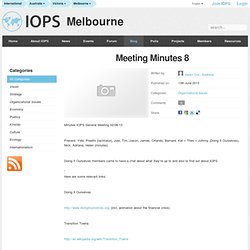
#9 16.6.13. Attending: Timothy Erik Ström – minutes Helen Cox Youbi Lee.
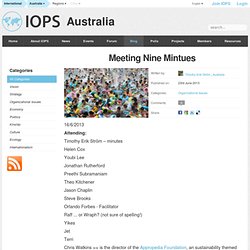
#10 7.7.13. Date: Sunday the 7th of July 2013Present: [11] Louis, Vaughn, Orlando, Helen, Youbi, Jet, Roger, Theo and Joel.Facilitation: TimMinutes: Jason 14:10 Commencement Apologies: Reg, Preethi and James IntroductionsParticipants were asked to name themselves and one or two historical figures of interest.
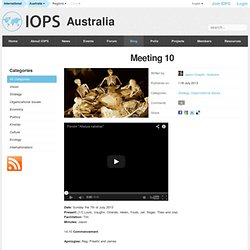
#11 21.7.13. Date: Sunday the 21st of July 2013 Present: [9] Joel, Jet, Tim, Jason, Yuobi, James, Stephen, Orlando and Preethi.
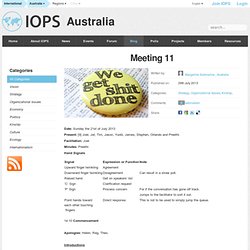
Facilitation: Joel Minutes: Preethi Hand Signals 14:10 Commencement Apologies: Helen, Reg, Theo. Introductions Participants were asked to name themselves, a book they like/are reading and their goal for the meeting. Books/authors: Wikileaks and the age of transparency [Micah L. Report Backs: Particigogy Language Education Project – Orlando Report back on responses of ESL educators who have been contacted about volunteering for this project. Participation Planet Art Project – Youbi The second session was conducted on Friday the 28th at Federation Square. Another session will occur at CERES next Sunday. #12 4.8.13. IOPS . org. BLOGS. > Intl. > Australia.
> Victoria. > Melbourne. FREQUENTLY VISITED. MELBOURNE. Latest Blogs Open Meeting 2014.6 (30/3/14) - Minutes Present: Helen, Jason, Jet, Joel, Tim. # How to improve meetings Jason suggest we could keep more actions synchronised with ad-hoc email conversations. # 17th April: Talk with Vince Emmanuelle Theme: "War & the environment"… Notes from SOSA Meeting 6th March SOSA Public Meeting RMIT Theatre 12.7.2 - 6th March 2014 - Report Back by Preethi Background During the Trades Hall meeting regarding the Summary Offences and Sentencing Amendment Bill there was a lack of ongoing campaign suggestions.
The meeting… > Blog. > Projects. > Members. INTL News. ACTIVE MEMBERS (Project) Purpose For discussing things that concern specifically those engaged in the meetings and current activitities of IOPS Victoria. Administrative Please join this project if you are involved in IOPS VIC meetings. Doing so will be helpful in composing messages addressed to active members. Instead of having to click Victoria and pick out names one by one, one can just click Active Members (as pictured) and rest assured that no one has been left out. Site Design & Management Established active members interested in invovlement in the IOPS VIC page’s design and management can request to have their user status bumped up to that of administrator, which allows access to relevant functions (see this video for details).
INTL Forum. > Interim Goals. > Strategy & Organization. > Website. MISC B'GROUND & FOCUS. POLL: Founding Convention Preconditions (Final Run-off) [+ Discussion] [May 2013] What might further activities include? > Mission. > VIsion. > Structure & program. > Getting Involved. What can people do now to be constructively involved in IOPS? The first step is to sign up. To be sure you want to do this, and that it is appropriate for you and the organizational effort, examine the organizational description of goals, structure, etc. If you still have questions or concerns, please read the Why Join IOPS - Questions and Answers, ask a question in the pre-membership public forum or send us a message.If you decide to do so, please enter your email, a password you choose, and please also upload a photo and enter a succinct bio. SOCIAL MEDIA.
FB. YOUTUBE. TWITTER. TUMBLR. / IOPS. History[edit] IOPS member Noam Chomsky about the organization's potential: "IOPS strikes the right chords, and if the opportunities it opens are pursued with sufficient energy and participation, could carry us a long way towards unifying the many initiatives here and around the world and molding them into a powerful and effective force. "[3] In 2011, over 4,000 people participated in a poll concerning a hypothetical international organization.[4] In accordance with the highly positive results yielded by the poll, those most eager adopted the poll as a guiding document for establishing an interim process for developing a new international organization based on local chapters. These persons formed an interim consultative committee to fulfil such a process.[5] IOPS member Vandana Shiva among others signed an open letter commenting on the organizations commitments: "The IOPS commitments emerged from a long process of discussion and debate.
Mission[edit] Structure[edit] See also[edit] / Anarchism. The central tendency of anarchism as a social movement has been represented by anarcho-communism and anarcho-syndicalism, with individualist anarchism being primarily a literary phenomenon[25] which nevertheless did have an impact on the bigger currents[26] and individualists have also participated in large anarchist organisations.[27][28] Many anarchists oppose all forms of aggression, supporting self-defense or non-violence (anarcho-pacifism),[29][30] while others have supported the use of some coercive measures, including violent revolution and propaganda of the deed, on the path to an anarchist society.[31] Etymology and terminology[edit] The term anarchism is a compound word composed from the word anarchy and the suffix -ism,[32] themselves derived respectively from the Greek ἀναρχία, i.e. anarchy[33][34][35] (from ἄναρχος, anarchos, meaning "one without rulers";[36] from the privative prefix ἀν- (an-, i.e.
"without") + ἀρχός, archos, i.e. History[edit] / Libertarian socialism. Overview[edit] Libertarian socialism is a Western philosophy with diverse interpretations, though some general commonalities can be found in its many incarnations. Its proponents generally advocate a worker-oriented system of production and organization in the workplace that in some aspects radically departs from neoclassical economics in favor of democratic cooperatives or common ownership of the means of production (socialism).[33] They propose that this economic system be executed in a manner that attempts to maximize the liberty of individuals and minimize concentration of power or authority (libertarianism). / Participism. Participism is a libertarian socialist political philosophy consisting of two independently created economic and political systems: participatory economics or "parecon" and participatory politics or "parpolity".
Participism is intended as an alternative to both capitalism and centrally-planned state socialism. / Participatory economics. Albert and Hahnel stress that parecon is only meant to address an alternative economic theory and must be accompanied by equally important alternative visions in the fields of politics, culture and kinship. The authors have also discussed elements of anarchism in the field of politics, polyculturalism in the field of culture, and feminism in the field of family and gender relations as being possible foundations for future alternative visions in these other spheres of society.
/ Participatory politics. Participatory politics or parpolity is a theoretical political system proposed by Stephen R. Shalom, professor of political science at William Paterson University in New Jersey. It was developed as a political vision to accompany participatory economics (Parecon). Both Parecon and Parpolity together make up the libertarian socialist ideology of Participism; this has significantly informed the interim International Organization for a Participatory Society. / Direct democracy. Direct democracy (also known as pure democracy)[1] is a form of democracy in which people decide (e.g. vote on, form consensus on, etc.) policy initiatives directly, as opposed to a representative democracy in which people vote for representatives who then decide policy initiatives.[2] Depending on the particular system in use, it might entail passing executive decisions, the use of sortition, making laws, directly electing or dismissing officials and conducting trials.
Two leading forms of direct democracy are participatory democracy and deliberative democracy. Most countries that are representative democracies allow for three forms of political action that provide limited direct democracy: referendum (plebiscite), initiative, and recall[citation needed]. Referendums can include the ability to hold a binding vote on whether a given law should be rejected. Doing It Ourselves . org. The Sharehood . org. > FB. Real Democracy Australia . org. > FB. 01 Shadows of Liberty . org.